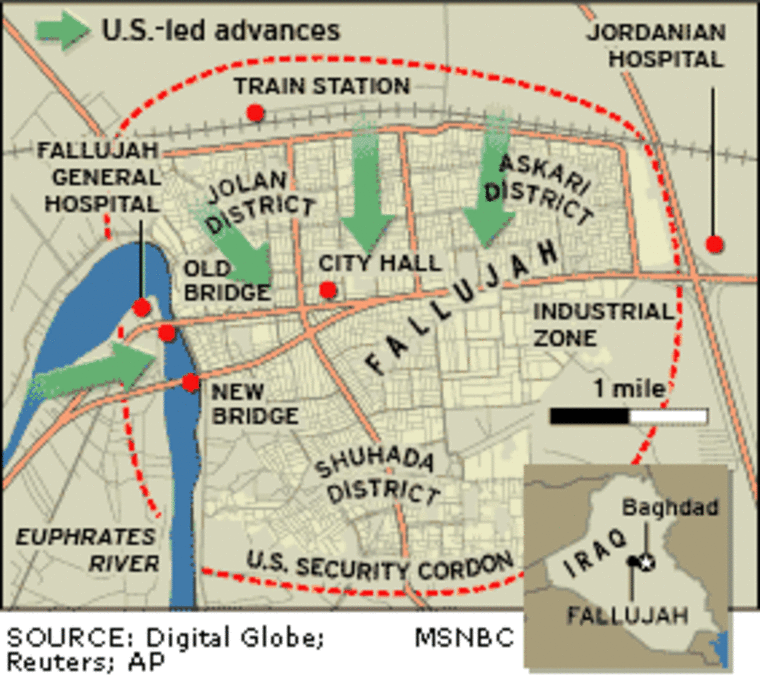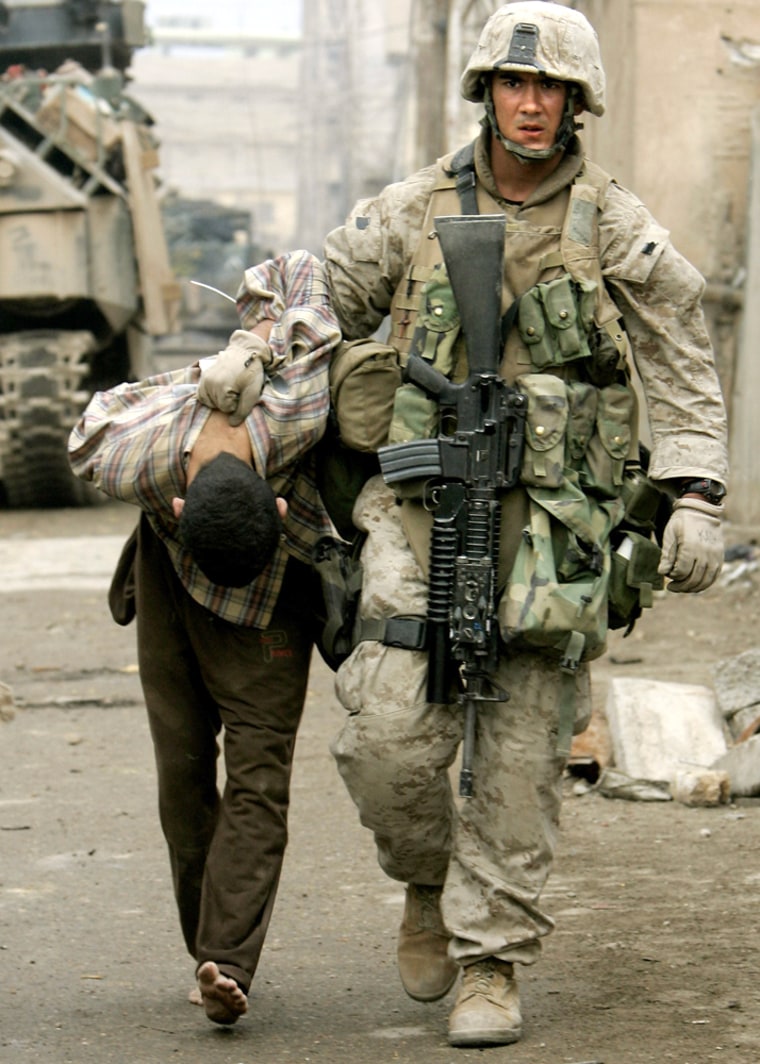Trooping past bodies and abandoned weapons, U.S. Marines blasted their way through walls and hammered open doors Friday in the hunt for insurgents in Fallujah. On the Muslim holy day, no calls to prayer were heard in a town dubbed “the city of mosques.”
As the main offensive pushed into the southern part of the city, Marines scoured a northern district looking for fighters hiding behind the front line.
“What we’re doing now is killing any that snuck in behind us or we might have missed earlier. And blowing up weapons caches,” said 2nd Lt. Adrian Pirvu, 22, of Dearborn, Mich., leading a patrol from the 3rd Battalion, 5th Marine Regiment.
Explosions began rocking Fallujah at dawn and U.S. warplanes swooped out of the sky to blast targets with machine-gun fire. Howitzer and mortar shells slammed into the city, flinging chunks of shrapnel hundreds of yards.
“Damn, flying Harleys!” one of the Marines quipped as one piece of steel whirred overhead.
Heavy gunfire could be heard across the city of low, yellow-brick buildings silhouetted by tall minarets from mosques. The few civilians in the streets were outnumbered by dogs and cats skittish from the sounds of combat.
Remains of the battle
Avoiding narrow alleys that can be turned into deathtraps by guerrillas, the Marines moved through the neighborhood by using plastic explosives and blasting cord to knock down doors and tear open walls connecting darkened homes. They also leaped from roof to roof, carrying a sledgehammer to break open locked, metal doors leading down into buildings.

In one house, they found two bodies in a room scattered with AK-47 assault rifles and rocket-propelled grenade launchers. The two men, limbs stiff in the rictus of death, apparently died in combat earlier in the week when the U.S. offensive pushed through.
“The terrorists, they deserve it,” said Lance Cpl. Freddy Ramosavila, 22, of Commerce City, Colo. “Better them than me. They’re killing us, too.”
Marines said the fight had been easier, and faster, than they expected.
Officers estimated between 1,000 and 5,000 fighters were holed up in Fallujah when the attack began early Monday after a heavy artillery bombardment that collapsed some buildings and spattered shrapnel into others.
Weapons and prayer beads
“I don’t know if they ran, but you can see all the weapons on the ground,” Cpl. Jeremy Mueller said, referring to the ammunition boxes, body armor, grenades and rifles lying in doorways on many streets.
“I guess they’re pulling back into the center of the city, where they must have stockpiles. But they won’t carry their guns, because they know if we see them, we’ll shoot them,” said the 23-year-old from Steelville, Ill.
As they moved from building to building, the Marines checked through cupboards and drawers, looking for weapons and ammunition, but more often coming across the mundane of daily life, including family photos and prayer beads.
Early Friday, a group of eight Iraqi civilians waved a green flag of surrender at the patrol, which herded the group together for transfer off the battlefield.
“We’re not animals. When we come across innocents, we try to hook them up,” said Pirvu, the commander.
They also captured a man in a white dishdasha robe who they said shot at them the previous evening.
Paving the way for elections
Although U.S. commanders have warned that capturing Fallujah won’t immediately break the resistance, they hope stepped-up offensives against insurgents will spread security and increase the chances for successful elections planned for January.
Pirvu’s Marines see themselves as advancing democracy’s cause, by delivering Fallujah back into the hands of Iraq’s interim government.
“You can’t have a democracy across the country but, OK, not this city and not this city. That’s why we’re taking the city,” the lieutenant said. “Imagine elections where you say, for example, Alabama can’t vote?”
